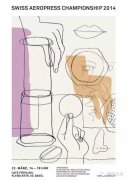Detailed steps of hand-brewing coffee drinking coffee car boutique coffee beans
Extraction quantity
It was mentioned at the beginning that the ratio of powder to extraction is about 1:20, but that refers to the maximum amount of extraction, so if achieved at 1: 20:00, the taste of coffee will be relatively much lighter. From the beginning of steaming, coffee particles will begin to absorb hot water and exhaust, about the second to the third time, you will find that coffee begins to be extracted from the filter cup, and when all the particles are fed with water, the extraction is almost over, and the subsequent action of adding water is just to adjust the concentration of coffee. When brewing for an unfamiliar formula or a single product, three different amounts of extraction can be used as a reference. The ratio of 1:20 is suitable for most coffee, but it may not be suitable for all coffee beans. therefore, it is recommended that you can start from 1:15 extraction, and then slowly increase the amount of extraction to find the appropriate concentration.
When steaming, the range is limited to the size of a fifty-cent coin, mainly because the powder layer in the middle is the thickest, so it is necessary to ensure that the particles can eat hot water evenly, and the next amount of water should not be too much. because at this time, it is more necessary to maintain the area where water is added in the original steaming range, and also to inject the water column from the middle and slowly around it. During this period, a pile of bubbles can be seen, which is proof of particle exhaust. Hot water is added until the bubble spreads out and it can be stopped.
Exuberant bubbles represent the proof of the recovery space of coffee particles, so the more exuberant the bubbles are, the better the space will be restored. The complete space recovery also means that more hot water will be immersed into the particles, and the extraction rate will be relatively increased. After stopping adding water for the first time, the next time to add water for the second time, you must wait until the bubbles stop coming out before you can start adding water again. On the one hand, it is to make the exhaust flow smoothly. On the other hand, if you add water earlier, it will block the exhaust gas because of water pressure.
Next, add water.
When adding water for the third time, we should pay attention to the decline of the water level, that is, the integrity of the exhaust. From steaming to the second addition of water, we have been controlling the appropriate amount of water so that the coffee particles are not soaked in the water before they are discharged. Therefore, before confirming that the particles in the filter paper are uniform draught, the amount of water should not be too much. The scope of the third rehydration starts from the middle, and then slowly pour water around the circle clockwise. Don't be impatient during the circle, the key point is to inject hot water into the powder layer. After that, the way of water injection is the same, until the bubbles are covered with the surface, which means that most of the particles are fully drained, and the next step is to increase the amount of water and start diluting.
The exhaust and brewing of coffee beans in the process of steaming and the first injection of water, it should be found that the particles have dense bubbles, sometimes big and sometimes small, which are quite irregular. These bubbles actually represent the coffee breathing, that is, the act of release. Coffee is to roast the original water-containing raw beans, slowly and evenly extract the water bit by bit. After the water is extracted, the original space will naturally be compressed and then cracked, and the heat will be drawn again through the cracked place. finally, the time of laying the beans is determined by the depth of baking. When the particles encounter hot water, these dry spaces will be activated by hot water, and in the process of expansion, they will be pushed into the original space and released gas, which is the source of bubbles. In addition to absorbing hot water, coffee also slowly expands by inhaling carbon dioxide in the air, so sometimes we see coffee bags slowly expand, so it can be thought of that the longer the coffee is kept, the slower the exhaust will be. The gas release period is the proof of coffee particles inhaling hot water. The more bubbles are discharged, the more complete the space is, and the more hot water can enter the particles, thus achieving the basic condition of high extraction rate. From the theory of bubble generation, it is not difficult to detect that after the first flushing of steaming, we must wait until the water level drops to the near bottom before starting to inject the second water. The first water injection of stuffy steam will certainly produce more blisters, and a large amount of exhaust is proof of space recovery, so if you do the replenishment action before the end of the exhaust, it will suppress the exhaust process, so let the water level fall close to the bottom. Can ensure the integrity of the exhaust process, but also allow the space to be optimized.
Coffee wall
In the process of increasing the hot water, the coffee particles around the filter paper will slowly rise, and the impurities brought by the particles due to exhaust will be adsorbed on the filter paper, thus forming the so-called coffee wall. The quality of the coffee wall affects the extraction rate because the denser it is attached to the filter paper, the water has to be filtered from the bottom of the filter cup because of the high density on both sides, so that the coffee can be extracted enough. Once over the coffee wall, the water will overflow and flow along the outside of the filter paper to the next pot, which will dilute the coffee before the end of the extraction. What the coffee wall needs is not the thickness, but the miscellaneous mass brought by the coffee particles in the exhaust process. The more impurities discharged, the more they will naturally adhere to the filter paper, and the impurities attached to the filter paper will plug the filter paper in disguise, and the speed of extraction will be slower. As a result, the coffee will stay in hot water for longer, thus increasing the extraction rate. In addition, the water level of the filter paper will slow down with the number of times of adding water, which also tells us that the miscellaneous mass discharged is increasing, which is equivalent to releasing the substance of coffee into the water all the time.
Coffee wall, amount of water, time point
"when the water level reaches the bottom, you can start to add water and know the height of the coffee wall." Coffee will slowly expand due to the absorption of carbon dioxide over time, so the second time to add water will also be earlier because of exhaust conditions. Exuberant exhaust: when the exhaust is exuberant, the time to add water is to wait until the water level falls to the bottom, make sure the exhaust is complete and then add water. Exhaust is not exuberant: beans with less exhaust, the time to add water is a little earlier, the extraction water column becomes smaller, you can add water.
Important Notice :
前街咖啡 FrontStreet Coffee has moved to new addredd:
FrontStreet Coffee Address: 315,Donghua East Road,GuangZhou
Tel:020 38364473
- Prev

The baking degree determines the taste spectrum towards deep roasting, shallow roasting, moderately roasted coffee beans.
Coffee taste spectrum consists of "smell spectrum" and "taste spectrum"; the former directs dry and wet fragrance, while the latter refers to water-soluble taste. The aroma of "odor spectrum" is appreciated by the sense of smell before and after the nose, and the liquefaction taste of "taste spectrum" is captured by the sense of taste. The "smell" and "taste" of coffee often vary with variety, altitude, soil and water, producing area, post-preparation, extraction and roasting degree, but
- Next

What is coffee beans? How to grow beans in English
Coffee beans, like cooking, have to go through the process from raw to ripe in order to produce drinks with unique aroma. From the early refreshing function to today's taste buds enjoyment, ** domestic ** from Starbucks to boutique coffee shops, a bridge-like concept has been proposed, that is, fresh roast! Whether it's information I've received since I started or cursory research
Related
- Beginners will see the "Coffee pull flower" guide!
- What is the difference between ice blog purified milk and ordinary milk coffee?
- Why is the Philippines the largest producer of crops in Liberia?
- For coffee extraction, should the fine powder be retained?
- How does extracted espresso fill pressed powder? How much strength does it take to press the powder?
- How to make jasmine cold extract coffee? Is the jasmine + latte good?
- Will this little toy really make the coffee taste better? How does Lily Drip affect coffee extraction?
- Will the action of slapping the filter cup also affect coffee extraction?
- What's the difference between powder-to-water ratio and powder-to-liquid ratio?
- What is the Ethiopian local species? What does it have to do with Heirloom native species?

